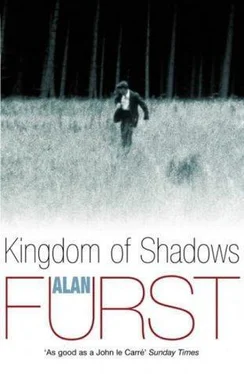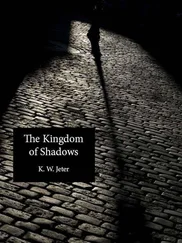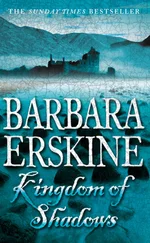“Are they holding anyone else up here?”
“There were two others, but they left yesterday.”
Now they heard sirens and they ran, coughing, hands over mouths, down the stairs through the rising smoke.
The street in front of the Schoenhof was utter confusion. Fire engines, firemen hauling hoses into the hotel, policemen, crowds of onlookers, a man wearing only a blanket, two women in bathrobes. Morath guided Kolovitzky across the Mauerplatz, then a little way down a side street. As they approached, the driver of a battered Opel started his car. Kolovitzky got in the backseat, Morath in front.
“Hello, Rashkow,” Morath said.
“Who is he?” Kolovitzky asked, later that morning, while Rashkow watered a tree by the roadside.
“He’s from Odessa,” Morath said. Poor little Rashkow, Balki had called him, who’d sold Russian railroad bonds and Tolstoy’s unfinished novel and wound up in a Hungarian prison. Morath had gone to Sombor to get him out of jail. “He used to sell Russian bonds.”
“The way he looks,” Kolovitzky said. “He should come to Hollywood.”
Rashkow drove on farm roads through the Austrian countryside. A day in July, the beets and potatoes sprouting bright green in the rolling fields. It was only forty miles to the Hungarian border at Bratislava. Or Pressburg, if you liked, or Pozsony. In the backseat, Kolovitzky stared at the Austrian passport with his photo in it. “Do you think they’re looking for me?”
“Of course they are.”
They stopped well short of the Danube bridge, in Petrzalka, once a Czech border point, now in the Slovakian Protectorate. Abandoned the car. Went to a rented room above a cafe, where all three changed into dark suits. When they came downstairs, a Grosser Mercedes with Hungarian diplomatic registration was waiting for them, driven by the chauffeur of one of Bolthos’s diplomatic colleagues in Budapest.
There was a swarm of Austrian SS gathered at the border crossing, smoking, laughing, strutting about in their high, polished boots. But the chauffeur ignored them. Rolled to a smooth stop at the customs building, handed four passports out the window. The border guard put a finger to the visor of his cap, glanced briefly into the car, then handed them back.
“Welcome home,” the chauffeur said to Kolovitzky, as they crossed to the Hungarian side of the river.
Kolovitzky wept.
A midnight supper on the rue Guisarde.
Mary Day knew the trains were late, crossing Germany, so she’d planned for it. She set out a plate of sliced ham, a vegetable salad, and a baguette. “And this was delivered yesterday,” she said, taking a bottle of wine from the cupboard and a corkscrew from the kitchen drawer. “You must have ordered it by telephone,” she said. “Very thoughtful of you, in the middle of-whatever it was, to think of us.”
A 1922 Echezeaux.
“It’s what you wanted?”
“Yes,” he said, smiling.
“You are really very good, Nicholas,” she said. “Really, you are.”












